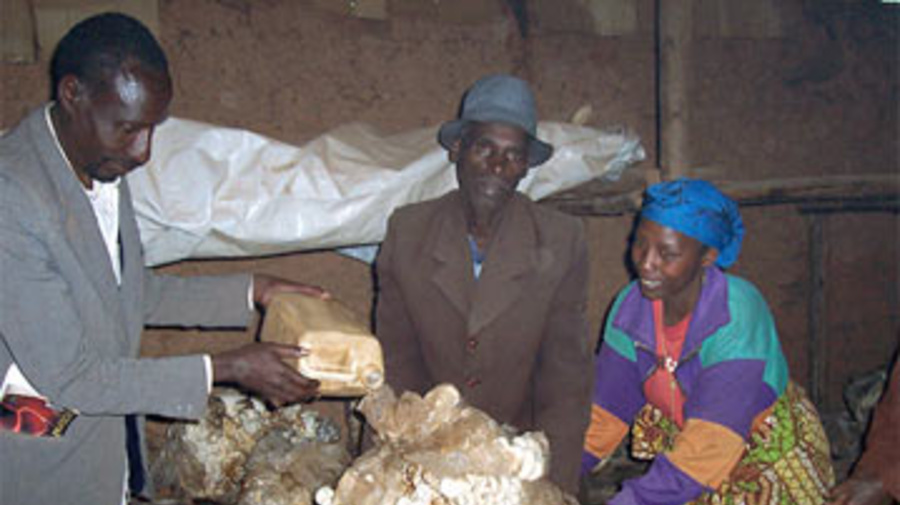No, they're not magic, but mushrooms help refugees in Rwanda
No, they're not magic, but mushrooms help refugees in Rwanda

In a special dark growing chamber, Congolese refugees at Rwanda's Gihembe camp show off some of their prize mushrooms, which are transforming the lives of people with HIV.
GIHEMBE REFUGEE CAMP, Rwanda, June 13 (UNHCR) - Marie, one of 17,000 Congolese refugees in this camp in northern Rwanda, has a more varied diet than most - it includes lots of home-grown mushrooms.
"Mushrooms have a nice taste when cooked with oil, tomatoes and peanuts, which makes a nice change from our regular diet in the camp," she says with a smile.
Marie, who is HIV-positive and asked that her real name not be used, feels that "eating mushrooms is helping me to cope with the antiretroviral [ARV] medicine" she takes to prolong her life. She is one of 20 HIV patients in the camp who are benefiting from ARV treatment and food supplements provided by UNHCR and the American Refugee Council.
The mushrooms she loves so much are grown in the camp, thanks to the ingenuity of another refugee, Jacob, who fled his small village in North Kivu in the Democratic Republic of the Congo a decade ago for fear of attacks by Rwandan armed groups. (Gihembe was opened in 1997 to shelter Congolese who fled attacks against civilians in the Kivu region.)
Jacob, who also uses an alias, noticed that Gihembe's cool location on top of a hill made it an ideal place to grow mushrooms. Using knowledge gained from a community-based association in Kigali called Jyambere (Develop Yourself), Jacob enlisted 19 members of the People Living with AIDS Association (PLWA) to start a mushroom production project to enrich their diet and earn money.
The mushroom "farm" is a small, dark room adapted to this purpose, a rare plot of land in a highly populated refugee camp where there is no room for any other kind of agriculture or livestock activity.
"I like seeing the positive results of the mushroom production project," Jacob explains in good French, "since this is helping those people living with HIV/AIDS to cope with the difficult daily life that results from their weak physical conditions."
The project is supported by the American Refugee Council (ARC) - a major UNHCR partner in managing camps in Rwanda and in HIV/AIDS activities.
Members of the PLWA produce 30-50 kilogrammes of mushrooms per month; they eat some themselves, and sell the rest at 1,000 Rwandan francs per kilo (about US$2) to other refugees in the camp.
With future profits, they hope to be able to buy milk and vegetables to vary their diet. While mushrooms have no magical properties, a varied diet and good nutrition help HIV-positive patients better tolerate ARV treatment, doctors say.
The association started with just six members two years ago - encouraged by the good results of the mushroom project, the number has soared to 73.
"Before the association was created, people affected by HIV/AIDS in the camp were isolated due to the stigma still associated with this illness in Africa," says Jacob. "Because of this self-reliance project, more and more people are approaching us to learn more about our activities."
These include meetings where the members share their feelings and concerns. They also organize sensitization visits to households with family members affected by the illness to encourage them to join the association, and plan to help other Congolese refugees in the neighbouring camp of Nyabiheke create a similar association for people with HIV and AIDS.
Thanks to the close collaboration between UNHCR, ARC and the Rwandan authorities, Gihembe is home to a number of HIV/AIDS sensitization and prevention activities. Aside from PLWA, there are three other AIDS awareness groups working in the camp.
According to official data, only 90 people in the camp have HIV or AIDS, but consultation and testing services have been scaled-up in the camp's health centre and a new service aimed at preventing mother-to-child transmission started. A truer picture of the situation in Gihembe should soon emerge.
Meanwhile, PLWA plans to increase the quantity of mushrooms sold outside the camp, because they find Rwandans have accepted the delicacy quite well.
And as important as the mushrooms themselves is the message of hope the refugees are sending. "We hope we can be a good example for similar associations in other refugee camps in Africa to help others affected by the illness to have better living conditions, and to help fight the stigma against HIV in Africa," says Jacob.
By Beatriz Gonzalez in Gihembe Camp, Rwanda









